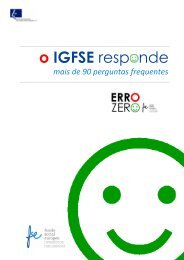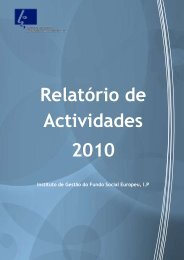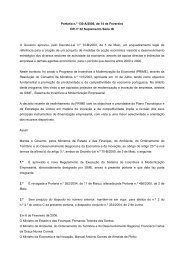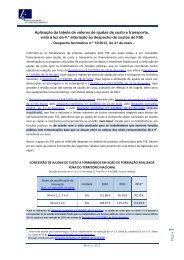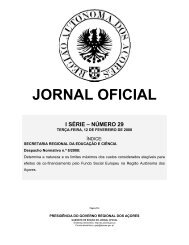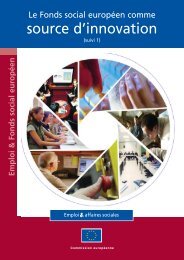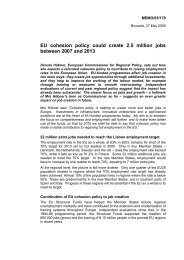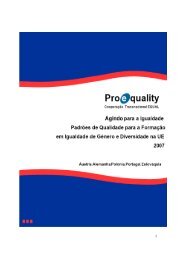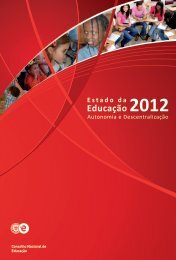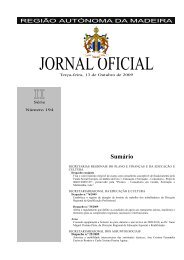Industrial Relations in Europe 2012 - European Commission - Europa
Industrial Relations in Europe 2012 - European Commission - Europa
Industrial Relations in Europe 2012 - European Commission - Europa
Create successful ePaper yourself
Turn your PDF publications into a flip-book with our unique Google optimized e-Paper software.
social partners' <strong>in</strong>creas<strong>in</strong>g role as consulted stakeholders <strong>in</strong> the preparation of legislative or strategic<br />
proposals (see also box 7.3).<br />
The chapter will start with a chronological presentation of the four sectoral social partner<br />
agreements reached <strong>in</strong> <strong>2012</strong>. This is followed by an overview of the activities connected to the<br />
crisis, <strong>in</strong>clud<strong>in</strong>g the related topics of restructur<strong>in</strong>g, tra<strong>in</strong><strong>in</strong>g and skills. Section 7.3 summarises the<br />
work of the sectoral social dialogue committees <strong>in</strong> other fields, such as health and safety, corporate<br />
social responsibility and gender equality, while the f<strong>in</strong>al part of the chapter reports on an evaluation<br />
of past actions developed <strong>in</strong> the cross-<strong>in</strong>dustry social dialogue committee.<br />
Box 7.3 Social partner <strong>in</strong>volvement <strong>in</strong> impact assessments<br />
In l<strong>in</strong>e with Articles 8-10 TFEU, the <strong>Europe</strong>an <strong>Commission</strong> conducts comprehensive assessments<br />
of the potential impacts of all its policies and <strong>in</strong>itiatives. Stakeholders are consulted <strong>in</strong> a systematic<br />
manner dur<strong>in</strong>g the preparation of these impact assessments. The guidel<strong>in</strong>es used <strong>in</strong> prepar<strong>in</strong>g the<br />
assessments highlight the obligation to consult <strong>Europe</strong>an sectoral social dialogue committees <strong>in</strong><br />
cases where the <strong>Commission</strong> <strong>in</strong>itiative could be expected to entail social implications for the<br />
concerned sector(s).<br />
While based on available <strong>in</strong>formation, consultation of sectoral social dialogue committees is<br />
complementary to other forms of consultation, notably public consultations. It also differs from<br />
wider consultation of other actors of civil society <strong>in</strong> that social partners engaged <strong>in</strong> <strong>Europe</strong>an<br />
sectoral social dialogue are recognised by the <strong>Commission</strong> as representative actors of the sector<br />
concerned. A possible jo<strong>in</strong>t position of the social partners <strong>in</strong> a sector can therefore give a strong and<br />
representative <strong>in</strong>dication about realistic policies and their impacts and implementation.<br />
A consultation of a sectoral social dialogue committee on an impact assessment covers the<br />
underly<strong>in</strong>g problem def<strong>in</strong>ition and basel<strong>in</strong>e scenario, subsidiarity questions, the relevant policy<br />
options and, <strong>in</strong> the further process, the estimated social and employment impacts of the various<br />
options and possible accompany<strong>in</strong>g or mitigat<strong>in</strong>g policy measures. Social partners are particularly<br />
well placed to provide detailed evidence and expertise for their sector, <strong>in</strong>clud<strong>in</strong>g data and other<br />
technical <strong>in</strong>put, thereby contribut<strong>in</strong>g to the quality of both the impact assessment and the<br />
<strong>Commission</strong>'s decision-mak<strong>in</strong>g.<br />
7.2 Ma<strong>in</strong> developments <strong>in</strong> <strong>Europe</strong>an social dialogue<br />
7.2.1 <strong>Europe</strong>an social partner agreements<br />
The two-year period s<strong>in</strong>ce 2010 has seen the sign<strong>in</strong>g of four sectoral social partner agreements:<br />
<strong>in</strong>land waterway transport, professional football, hairdress<strong>in</strong>g and sea fisheries. For the agreements<br />
<strong>in</strong> waterway transport and hairdress<strong>in</strong>g the social partners have requested implementation by<br />
Council decisions <strong>in</strong> accordance with Article 155(2) TFEU and the same request may be made by<br />
the social partners <strong>in</strong> the sea fisheries sector once their agreement is f<strong>in</strong>alised. The <strong>Commission</strong><br />
services are currently assess<strong>in</strong>g the two f<strong>in</strong>alised agreements with a view to decid<strong>in</strong>g whether to<br />
present a proposal to the Council. In l<strong>in</strong>e with a well-established procedure, the <strong>Commission</strong> is<br />
exam<strong>in</strong><strong>in</strong>g the representativeness of the signatory parties and their mandate, the legality of all<br />
262



